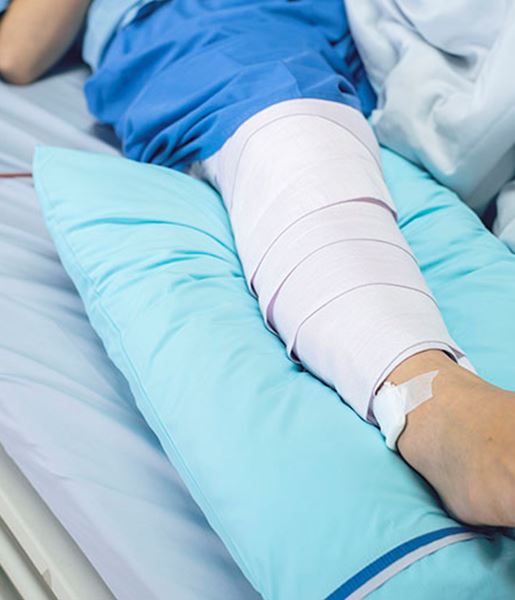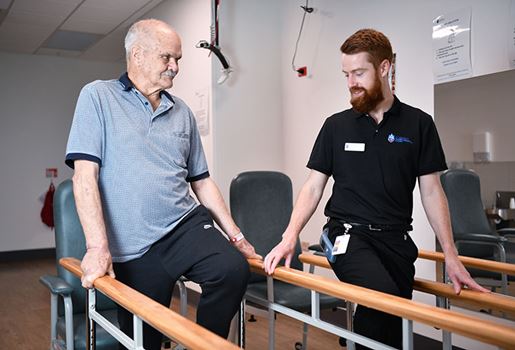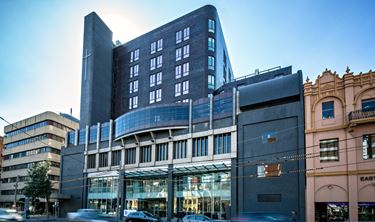Knee Reconstructive Surgery
- Home
- Services
- Orthopaedics
- Knee Orthopaedics
- Other Knee Surgeries and Procedures
- Knee Reconstructive Surgery
How do I know if I need knee reconstructive surgery?
The knee is one of the most complex joints in the body and it can be impacted by sudden injury that damages ligaments. Commonly this results in the knee giving way, recurrent pain, swelling or stiffness. If rest, pain relief and physiotherapy-led rehabilitation exercises are no longer helping, your doctor may recommend an MRI scan and possible knee reconstruction surgery.
ACL (anterior cruciate ligament) reconstructive surgery is an extremely common surgical procedure. As one of the four major knee ligaments, the ACL is also one of the most frequently injured. Your surgeon will usually take a tendon from your hamstrings, patellar tendon or quadriceps to replace the torn knee ligament.
Other ligaments often reconstructed include the posterior cruciate ligament (PCL) towards the back of the knee. This is commonly injured from direct impact such as a sports tackle or car accident, but does not always require surgery. The collateral ligaments on either side are usually damaged from a blow to the side of the knee. If the patella is not tracking correctly or it dislocates, this can also cause a feeling of knee instability and can be rectified by patella realignment surgery.
Other common procedures to reconstruct the knee joint and alleviate pain include partial meniscectomy to fix a meniscus tear, and a synovectomy to remove inflamed synovium that secretes fluid around the knee joint.
What are the general recovery times?
Reconstructive surgery can usually be performed as minimally invasive surgery using a tiny camera and small instruments. Recovery times will depend on the extent of the operation as well as your general health going into the procedure.
ACL and PCL reconstruction can take up to 12 months for a full recovery. Meniscus tears and synovectomies will have a shorter recovery period of around 6 weeks and a patella realignment may need up to 4 months recovery.
How the surgery is performed
Knee reconstructive surgery aka knee restoration surgery or knee repair surgery is a procedure aimed at repairing damaged structures in the knee, such as ligaments or cartilage. The specific technique used depends on the nature and extent of the knee injury. Common methods include arthroscopy, where small incisions and specialised instruments are used for minimal invasion, and open surgery for more extensive repairs. The surgeon may use grafts from your body, a donor, or synthetic materials to reconstruct damaged areas.
Preparation
Preparing for knee reconstructive surgery involves several steps to ensure your safety and the success of the procedure. You'll undergo a thorough medical evaluation, including imaging tests like MRI or X-rays, to assess the knee's condition. It's important to discuss your medical history, current medications, and any allergies with your surgeon. You may be advised to stop certain medications or supplements before surgery. Physical preparation, such as strengthening exercises, might be recommended to aid in post-surgery recovery.
Follow up
After knee reconstructive surgery, follow-up care is crucial for a successful recovery. This typically includes a stay in the hospital for initial recovery, followed by a rehabilitation program. Physiotherapy plays a vital role in regaining knee strength and mobility. You'll have regular check-ups with your surgeon to monitor your progress and address any concerns. It's essential to follow all post-operative instructions, including activity restrictions and wound care, to ensure optimal healing.

Other knee surgeries and procedures
Total knee replacement approaches
Knee Reconstructive Surgery FAQs

How much will my knee surgery cost?
Understanding the cost of your treatment is an important consideration before committing to surgery, but it’s not always easy to find the information you need. Learn more about the factors which contribute to the cost of your surgery:
What will my treatment and recovery look like?
Familiarising yourself with your treatment program and understanding the recovery process are important steps to take on the pathway to surgery.
Patient Journey – Knee Surgery

Find a hospital with orthopaedic services
Our Hospitals



